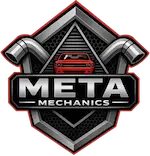At Meta Mechanics, we take pride in offering expert automotive services for luxury vehicles like the Range Rover Evoque. Recently, we had the opportunity to replace the turbocharger in a Range Rover Evoque experiencing significant performance issues. Upon inspection, our experienced technicians identified several underlying issues that contributed to the need for a turbo replacement. Below is a breakdown of the problems we discovered and the solutions we provided.
Identified Issues:
- Failed Turbo Bearings
- Problem: The turbocharger bearings were extensively worn out, causing a significant loss in performance. Worn bearings result in excessive shaft play, which causes the turbocharger to spin inefficiently. This leads to poor acceleration, a noticeable drop in engine power, and possible damage to the turbo components.
- Solution: After confirming the turbocharger failure due to worn-out bearings, we replaced the entire turbo unit with a high-quality OEM replacement part. This restored the turbocharger’s performance, ensuring smooth operation and consistent power delivery.
- Excessive Oil Leaks
- Problem: The turbocharger was leaking oil, which was a result of damaged seals. Oil leaks from the turbo can contaminate the exhaust system or the intake, leading to poor engine performance, possible engine damage, and exhaust smoke.
- Solution: We replaced the damaged oil seals and gaskets, and, upon inspection, determined that the turbocharger itself was beyond repair. To ensure proper functionality, we replaced the entire turbo unit and addressed any oil leakage issues to prevent further contamination.
- Blocked or Clogged Turbo Vents
- Problem: The turbocharger’s venting system was found to be clogged with carbon buildup, restricting the flow of exhaust gases. This can cause excessive turbo lag, reduced power output, and poor engine responsiveness.
- Solution: We cleaned the entire turbo vent system to eliminate carbon deposits and ensure that exhaust gases could flow freely. After the cleaning, we installed the new turbocharger, which restored proper venting and turbo functionality.
- Damaged Wastegate or Actuator
- Problem: The wastegate, responsible for controlling the boost pressure produced by the turbo, was found to be damaged. A faulty wastegate can result in irregular boost pressure, causing either underboost or overboost conditions that compromise engine performance and fuel efficiency.
- Solution: We replaced the faulty wastegate and actuator, ensuring that the new turbocharger would regulate boost pressure effectively. This repair restored the turbo’s ability to perform optimally, improving power delivery and fuel efficiency.
- Excessive Exhaust Backpressure
- Problem: The exhaust system was experiencing excessive backpressure, which was impeding the turbocharger’s efficiency. High exhaust backpressure can lead to turbocharger strain, reducing its performance and potentially shortening its lifespan.
- Solution: We inspected the exhaust system and discovered a blockage in the catalytic converter and exhaust pipes. We cleaned and repaired the exhaust system to reduce backpressure, which allowed the new turbocharger to operate efficiently and restored power and responsiveness.
Range Rover Evoque Turbocharger Removal and Replacement
Range Rover Evoque Turbocharger Inspection and Diagnostics
Range Rover Evoque Installation of OEM or Aftermarket Turbos
Range Rover Evoque Turbo Oil Line Replacement
Range Rover Evoque Turbo Coolant Line Replacement
Range Rover Evoque Wastegate and Actuator Replacement
Range Rover Evoque Turbo Boost Pressure Testing
Range Rover Evoque Exhaust System Inspection and Repair
Range Rover Evoque Turbo Performance Tuning and Calibration
Range Rover Evoque Engine Control Unit (ECU) Reprogramming
Range Rover Evoque Check for Oil Leaks and Sealing


